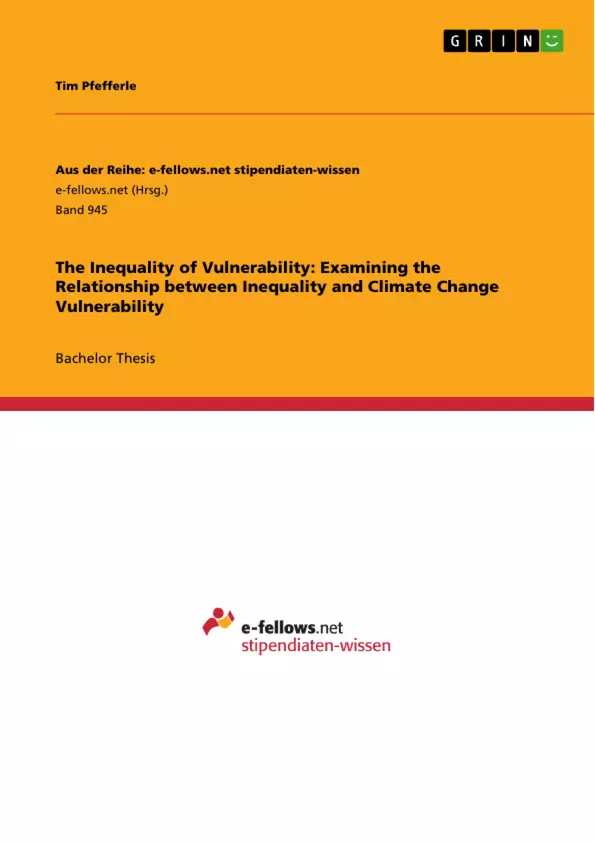Inequality and climate change have emerged as dominant themes of political and social enquiry. This study aims to link these two themes to develop an understanding of the interrelationship between inequality and climate change vulnerability. How does inequality shape vulnerability among different socio-economic groups? How is the vulnerability-inequality nexus related to the process of globalization? A number of negative outcomes of inequality are associated with factors contributing to climate change vulnerability. These will be traced within a discussion of two case studies focusing on Papua New Guinea and Tonga, two countries facing enormous climate risks. The study finds that globalization creates particular environments in which climate change vulnerability may be facilitated in the absence of targeted measures. These environments are particularly susceptible to the negative implications of inequality. Thus not only is inequality problematic from the perspective of access to resources, but also in the sense that political and social institutions are less responsive to the most vulnerable segments of unequal societies. In particular, the issues which create vulnerable environments are related to formal and informal social security as well as urbanization.
Inhaltsverzeichnis (Table of Contents)
- Introduction
- Literature Review
- Vulnerability
- Inequality
- Inequality and Climate Change Vulnerability
- Methodology
- Case Study 1: Papua New Guinea
- Society, Economy and the Environment in Papua New Guinea
- Inequality, Growth and Poverty in Papua New Guinea
- Formal Social Security
- Informal Social Security Systems
- Conclusion: Papua New Guinea
- Case Study 2: Tonga
- Society, Economy and the Environment in Tonga
- Food Security and Import Dependency
- The Role of Remittances: Labor Mobility and Resilience
- Urbanization, Inequality and Climate Change
- Conclusion: Tonga
- Conclusion
- References
Zielsetzung und Themenschwerpunkte (Objectives and Key Themes)
This study aims to explore the relationship between inequality and climate change vulnerability, examining how inequality shapes vulnerability among different socio-economic groups. The study will delve into the vulnerability-inequality nexus in the context of globalization, analyzing how this nexus contributes to climate change vulnerability. The study focuses on two case studies: Papua New Guinea and Tonga, both countries facing significant climate risks. The study will investigate how globalization creates environments susceptible to climate change vulnerability in the absence of targeted measures, particularly highlighting the negative impacts of inequality. Key themes of the study include:- The interrelationship between inequality and climate change vulnerability
- The impact of globalization on the vulnerability-inequality nexus
- The role of social security systems in mitigating vulnerability
- The influence of urbanization on inequality and climate change vulnerability
- The experiences of Papua New Guinea and Tonga in relation to climate change vulnerability
Zusammenfassung der Kapitel (Chapter Summaries)
The introduction sets the stage by highlighting the increasing evidence of climate change and its global impacts. It raises the question of whether climate change affects different societies in uniform ways, introducing the focus on the relationship between inequality and climate change vulnerability. The literature review delves into the concepts of vulnerability, inequality, and their intersection with climate change. The methodology chapter outlines the research approach, including the case study methodology and the selection of Papua New Guinea and Tonga as study sites. The first case study, Papua New Guinea, examines the country's socio-economic environment, including its susceptibility to climate risks. It analyzes inequality, growth, poverty, formal and informal social security systems, and the role of these factors in shaping vulnerability. The conclusion of the Papua New Guinea case study draws insights from the findings. The second case study, Tonga, explores the country's socio-economic environment, highlighting its reliance on imports for food security and the importance of remittances. It examines the role of urbanization in shaping inequality and vulnerability to climate change. The conclusion of the Tonga case study analyzes the findings and draws connections between the two case studies.Schlüsselwörter (Keywords)
The study focuses on the key concepts of inequality, climate change vulnerability, globalization, social security, urbanization, and the experiences of Papua New Guinea and Tonga.Frequently Asked Questions
How does inequality shape climate change vulnerability?
Inequality limits access to resources and makes political institutions less responsive to the most vulnerable, thereby increasing the risk faced by disadvantaged socio-economic groups.
What is the role of globalization in climate vulnerability?
Globalization can create environments where climate risks are amplified if targeted measures are absent, especially in unequal societies where social security is weak.
Why were Papua New Guinea and Tonga chosen as case studies?
Both countries face enormous climate risks and demonstrate how factors like urbanization, informal social security, and import dependency interact with inequality.
How does urbanization affect climate resilience?
Rapid urbanization often leads to increased inequality and places more people in vulnerable environments with inadequate formal or informal support systems.
What is the difference between formal and informal social security?
Formal social security refers to state-led programs, while informal systems involve community and family networks. Both are crucial in mitigating the impacts of climate change.
- Arbeit zitieren
- Tim Pfefferle (Autor:in), 2014, The Inequality of Vulnerability: Examining the Relationship between Inequality and Climate Change Vulnerability, München, GRIN Verlag, https://www.grin.com/document/275947



